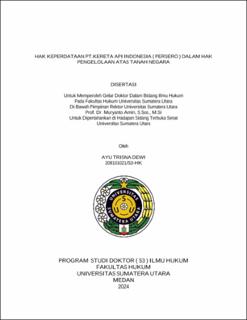| dc.contributor.advisor | Kamello, Tan | |
| dc.contributor.advisor | Yamin, Muhammad | |
| dc.contributor.advisor | Ikhsan, Edy | |
| dc.contributor.author | Dewi, Ayu Trisna | |
| dc.date.accessioned | 2025-04-16T03:39:45Z | |
| dc.date.available | 2025-04-16T03:39:45Z | |
| dc.date.issued | 2024 | |
| dc.identifier.uri | https://repositori.usu.ac.id/handle/123456789/103115 | |
| dc.description.abstract | PT.KAI (Persero) as one of the BUMN that is the subject of HPL law. Thus, there is confusion regarding the public and private nature of PT.KAI (Persero) as a SOE‘s. The transfer of civil rights in the management rights of state land illustrates the existence of public and private nature mixed in the body of SOE‘s and the existence of regulatory disharmony also places multiple perceptions regarding the actual position and character of PT.KAI (Persero). The transfer of civil rights of PT.KAI (Persero) in the management rights of state land is stated in the form of an agreement that is built while still paying attention to the principle of balance and the valid conditions of the agreement contained in the civil code. The basis for the transfer of civil rights in the management rights of state land is grondkaart which is the result of the nationalization of Dutch East Indies government assets into Indonesian state assets since independence. When viewed from a historical perspective, the State Wealth Law and the State Treasury Law, Soe‖s assets are state assets. However, this is contrary to the Soe‘s Law and several other regulations that place a private nature in the body of Soe‘s.The problem in this research are how is the application of the principle of freedom in the transfer of civil rights in the right to manage state land, what is the purpose of the transfer of civil rights in the right to manage and how the legal renewal should be in the transfer of civil rights of PT.KAI (Persero) in the right to manage state land become some formulations of the problem in writing this dissertation. The research in writing this dissertation uses a method of combining normative juridical with sociological juridical / empiricism using primary data and secondary data as well as data collection techniques through library research and field research which will be analyzed by drawing inductive deductive conclusions in the form of qualitative data analysis. The implementation of the principle of balance in the transfer of civil rights of PT.KAI (Persero) in the management rights of state land is not carried out in its entirety with the existence of several articles that are determined unilaterally and the purpose of the transfer of the transfer is to obtain profit because PT.KAI is seen as a business actor as well as other private legal subjects even though there is still disharmony in regulations in determining whether PT.KAI is a public legal entity or a private legal entity. So there needs to be a legal renewal that determines the position and construction of new laws in the regulation of regulations that are clear and synchronized with other regulations with the starting point being Pancasila as the philosophy of the nation's personality character of law.Which is not only the basis for forming legislation, but also contains moral and ethical values | en_US |
| dc.language.iso | id | en_US |
| dc.publisher | Universitas Sumatera Utara | en_US |
| dc.subject | SOE‘s | en_US |
| dc.subject | civil rights | en_US |
| dc.subject | management right | en_US |
| dc.title | Hak Keperdataan PT.Kereta Api Indonesia ( Persero ) dalam Hak Pengelolaan Atas Tanah Negara | en_US |
| dc.title.alternative | Civil Rights of PT. Kereta Api Indonesia (Persero) in Management Rights to State Land | en_US |
| dc.type | Thesis | en_US |
| dc.identifier.nim | NIM208101021 | |
| dc.identifier.nidn | NIDN0021046206 | |
| dc.identifier.nidn | NIDN0031126168 | |
| dc.identifier.nidn | NIDN0016026304 | |
| dc.identifier.kodeprodi | KODEPRODI74001#Ilmu Hukum | |
| dc.description.pages | 342 Pages | en_US |
| dc.description.type | Disertasi Doktor | en_US |
| dc.subject.sdgs | SDGs 16. Peace, Justice And Strong Institutions | en_US |


